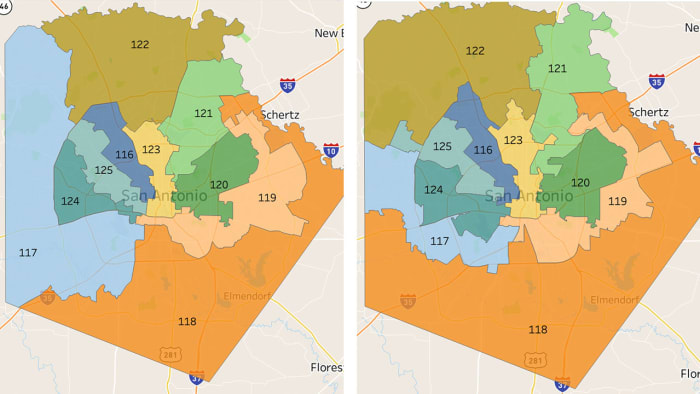The lawsuit accuses state lawmakers of violating the Voting Rights Act.
Attorney General Merrick Garland announced Monday that the U.S. Department of Justice is taking legal action against Texas over its new redistricting plan that disenfranchises Black and Latino voters. The Biden administration filed its lawsuit in federal court in Texas, claiming the redistricted congressional and state legislature maps violate the Voting Rights Act, ABC News reports.
“The complaint we filed today alleges that Texas has violated Section Two by creating redistricting plans that deny or bridge the rights of Latino and Black voters to vote on account of their race, color or membership in a language-minority group,” Garland said at a news conference Monday. The department’s career voting law experts have assessed Texas’s new redistricting plans and determine that they include districts that violate the Voting Rights Act,” he added.
“The Legislature refused to recognize the State’s growing minority electorate,” the lawsuit states. “Although the Texas Congressional delegation expanded from 36 to 38 seats, Texas designed the two new seats to have Anglo voting majorities.”
As reported by The Associated Press, when Texas Republicans approved the redrawn U.S. House maps in October, Democrats “denounced the reduction of minority opportunity districts,” the outlet writes.
“What we are doing in passing this congressional map is a disservice to the people of Texas,” Democratic state Rep. Rafael Anchia said to the chamber just before the final vote.
Texas added two seats in the U.S. House of Representatives after the 2020 census.
“However, Texas has designed both of those new seats to have White voting majorities,” said Associate Attorney General Vanita Gupta. “Instead, our investigation determined that Texas’ redistricting plans will dilute the increased minority voting strength that should have developed from these significant demographic shifts.”
The lawsuit alleges that by adopting a redistricted map, Texas “intentionally eliminated a Latino electoral opportunity in Congressional District 23, a West Texas district where courts had identified Voting Rights Act violations during the previous two redistricting cycles.”
According to the lawsuit, Texas “failed to draw a seat encompassing the growing Latino electorate in Harris County” and “excised minority communities from the core of the Dallas-Fort Worth Metroplex.”
“Texas also eliminated Latino electoral opportunities in the State House plan through manipulation or outright elimination of districts where Latino communities previously had elected their preferred candidates,” says the lawsuit.
In a tweet, the office of Attorney General Ken Paxton said the lawsuit was the “Biden Administration’s latest ploy to control Texas voters.”
“I am confident that our legislature’s redistricting decisions will be proven lawful, and this preposterous attempt to sway democracy will fail,” the attorney general’s office said.
Meanwhile, several individual voters and voters rights organizations have sued the state over the redistricting by Texas Republicans. This marks the third time the Department of Justice under the Biden administration has sued the state over an election issue.
“Our democracy depends on the right of eligible voters to cast a ballot and to have that ballot counted,” Attorney General Merrick Garland said.” The Justice Department will continue to use all the authorities at its disposal to protect this fundamental pillar of our society.”
Georgia’s new voting laws also drew a lawsuit this summer from the Biden administration, which is under pressure from the Democratic base to take greater action on voting rights, a top priority for the party ahead of the 2022 midterm elections. But time is running out and Senate Republicans have repeatedly blocked federal legislation to change election laws, including another attempt Wednesday.
Opponents of the Texas law known as Senate Bill 1 had already sued the state, accusing Republicans of setting out to disenfranchise minorities and other Democratic-leaning voters. The bill specifically targets Democratic strongholds and was followed by Abbott weeks later signing new voting maps that fortify the GOP’s slipping dominance amid the state’s explosive growth.

Abbott and other Texas Republicans say the changes provide safeguards against voter fraud, which is rare.
“Biden is coming after Texas for SB1, our recently enacted election integrity law,” Republican Texas Attorney General Ken Paxton tweeted. “It’s a great and a much-needed bill. Ensuring Texas has safe, secure, and transparent elections is a top priority of mine. I will see you in court, Biden!”
Under the new Texas law, people assisting voters who need help completing their ballot must take a longer oath that now includes acknowledging a penalty of perjury. It also removes old language about answering voters’ questions, which opponents say will harm voters with disabilities.
Mail-in ballots must also now include a driver’s license number or the last four digits of a Social Security number, which the Justice Department says raises the chances of ballots being wrongly rejected and excluding some eligible voters.
The law also bans 24-hour polling locations and drive-thru voting, which are not contested in the Justice Department’s lawsuit.
This is the Justice Department’s second lawsuit against Texas this year over voting rights.
It in early November sued Texas over a new law that curbs mail-in voting, alleging it improperly restricts disabled voters or voters who cannot read or write from being able to receive adequate assistance at voting locations.
Earlier this year, the department sued Georgia after it enacted a new election law that the Justice Department said infringes on the rights of Black voters. The two states are among a growing number of Republican-led U.S. states passing new laws restricting voting access amid former President Donald Trump’s continued false claims that his election defeat was the result of widespread fraud. The Justice Department’s authority over redistricting issues has been weakened in recent years, after the conservative-majority Supreme Court in 2013 gutted a key section of the Voting Rights Act that required states to get pre-clearance from the Justice Department before re-drawing their districts. Garland told reporters that while the department no longer has the power to examine re-districting before it goes into effect, it can still evaluate it for discriminatory impacts afterwards. This is a developing story, for updates go to www.saobserver.com






